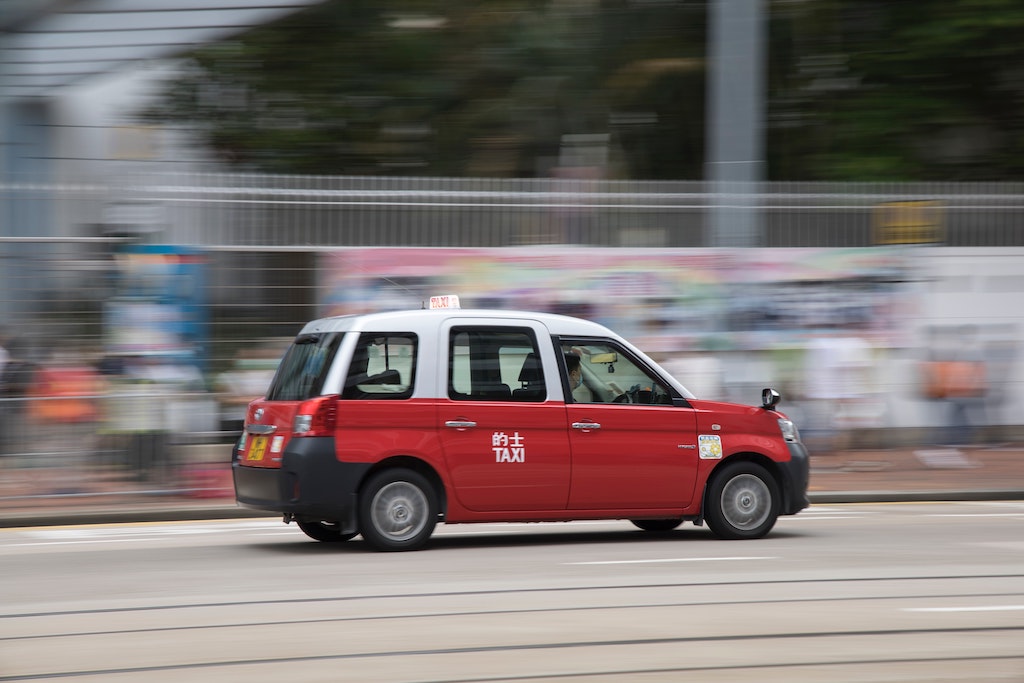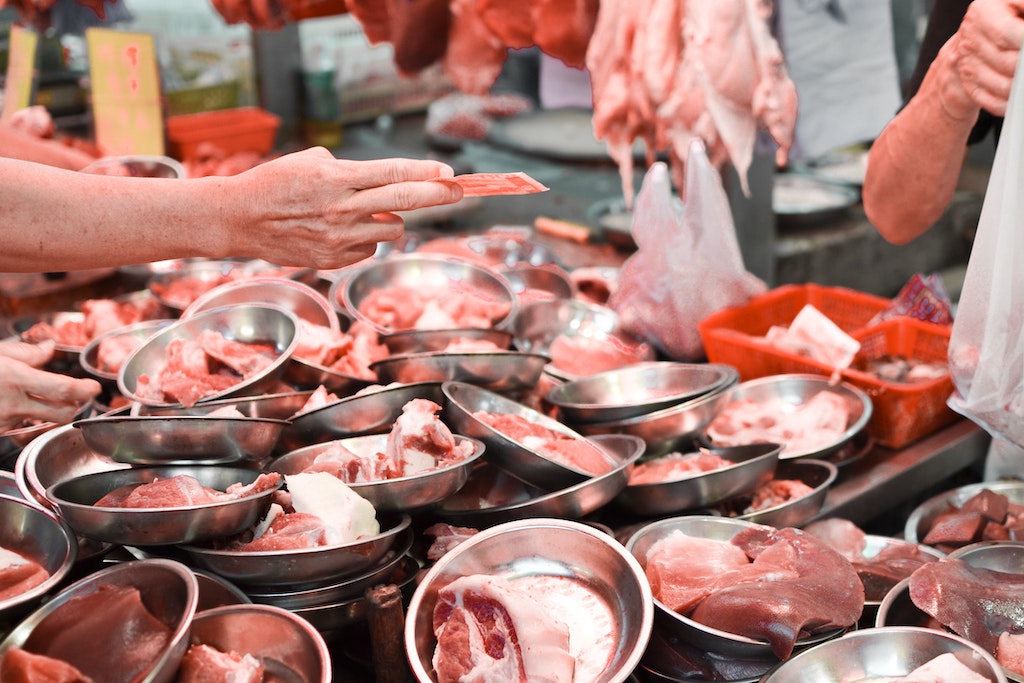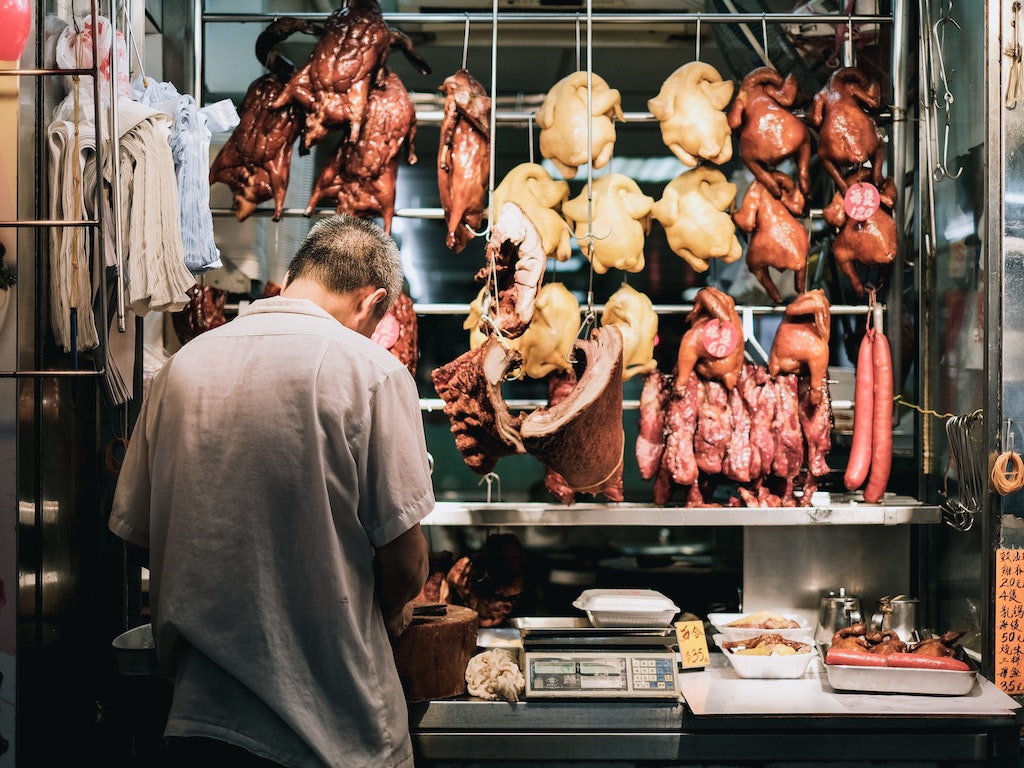5 Mins Read
Hong Kong’s government has published its climate action plan to achieve net-zero emissions by 2050. The four-pronged plan predominantly targets transport, energy, and buildings, with no mention of the city’s food sector. Globally, food accounts for nearly a third of human-caused emissions, primarily due to the production of meat, dairy, and seafood—and Hong Kong tops the list for meat consumption in the world.
The Hong Kong government announced its new Climate Action Plan 2050 on Friday (October 8), outlining its strategy to reach net-zero emissions by mid-century, in line with the Paris agreement. Under the plan, the government has set out four decarbonisation strategies to target energy, transport and waste—with no mention of cutting emissions from the food sector.
Chief executive Carrie Lam vowed the city would achieve net-zero emissions by 2050 earlier this year, shortly following Beijing’s move to set its timeline for 2060.
Energy, transport, waste

By 2035, Hong Kong wants to increase the share of renewable energy to 10% and end its reliance on coal. It also plans to cut emissions from the energy sector by reducing the electricity consumption of buildings, through “promoting green buildings” and “promoting a low-carbon lifestyle”.
In the transport sector, the government says it wants to end new fuel-based and hybrid cars by 2035, with the view to reach zero vehicular emissions before 2050, as well as introducing more electric buses and heavy vehicles in the years ahead.
To tackle waste, Hong Kong has committed to “develop adequate waste-to-energy facilities by 2035” to help transition the city away from its “reliance on landfills for waste disposal”. It will also encourage citizens to recycle and implement the long-awaited waste-charging scheme by 2023, as well as regulate single-use plastic tableware “in phases” from 2025.
HK$240 billion has been earmarked for climate mitigation and adaptation measures over the next 15 to 20 years, with a new dedicated climate action office to promote decarbonisation efforts, said the Hong Kong government.

No mention of food emissions
Already criticised for being not ambitious enough in its climate goals as one of the world’s richest cities, the government’s plan largely ignores Hong Kong’s enormous contribution to global food-related emissions, which make up nearly a third of all anthropogenic GHGs, according to UN FAO data.
Most of the world’s food emissions come from the animal agriculture sector, which uses up 70% of all arable land and contributes 18% of total GHG emissions—more than that of global transportation combined. Aviation, for instance, makes up around 2% of global emissions.
Hong Kong is one of the world’s biggest consumers of meat, with the average person eating around 5.5 times the international average. It is also the largest importer of beef from Brazil, where cattle rearing has driven the deliberate deforestation of the Amazon rainforest.

Read: All the reasons why Hong Kong needs a meat tax
In a 2018 study conducted by the Earth Science department of the University of Hong Kong (HKU), the city was ranked the 7th highest emitter per capita in the world, out of 113 regions examined. The city’s rising consumption of imported meat and dairy products was highlighted as a major driver of Hong Kong’s carbon footprint.
Despite this, the Hong Kong government has continued to focus on “energy saving and waste reduction” as the primary way to cut back on its emissions, with the environment secretary Wong Kam-sing describing the net-zero task as “extremely challenging” and requires public participation through “recycling in their daily lives”.
Wong said that Hong Kong will continue to update its targets every five years to “keep up with the times” as part of its “unwavering effort” to combat climate change.
Some citizens have already taken action into their own hands, choosing to adopt more plant-forward diets as part of their carbon reduction efforts. In a poll conducted by Hong Kong’s plant-based movement pioneer Green Monday, as many as a quarter of the city’s population now consider themselves flexitarians.

Not addressing food is ‘irresponsible, neglectful and dangerous’
Speaking to Green Queen Media about the failure to tackle the city’s food emissions in the new climate plan, Hong Kong plant-based movement veteran and regenerative agriculture advocate chef Peggy Chan said: “By not addressing ‘food’ as a major contributor to climate change is irresponsible, neglectful and potentially dangerous.”
“Where up to 37% of the world’s GHG emissions are derived from the food sector, Hong Kong’s climate action plan is misaligned with what all other major global scientific organizations are encouraging food businesses to do,” Chan continues, listing out the reduction of meat and fish intake and eliminating food waste among the top two priorities for the city. She also points to the need to support local food systems, as well as measuring the emissions from farm to table, while integrating “smart city and circular systems thinking knowledge into all designs”.
“As a city that imports over 97% of our food, we rely on a heavily industrialized food system that degrades soil, harms waterways, exploits workers and depletes all of the Earth’s natural resources,” argues Chan. For Hong Kong, a city whose ecological footprint is the third-worst in Asia, Chan says it is imperative for the climate action plan to target the crux of the problem—the fact that “food remains the largest contributor of our ecological footprint.”
“Our footprint [comes] from food consumption (21%) and restaurants and hotel services (8%),” she shares. “For the city to achieve carbon neutrality by 2050, it must work to address the footprint derived from our sector.”
All images courtesy of Unsplash.




